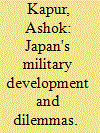| Srl | Item |
| 1 |
ID:
143352


|
|
|
|
|
| Summary/Abstract |
East Asian theatre is fast evolving. China’s arrival as a major power in international politics is altering the existing regional balance of power and intensifying Japan’s quest for securing a rightful place in the international system. Japan is reacting to the asymmetrical power politics and Shinzo Abe is increasingly becoming restless in attempting to redefine Japan’s secondary power identity. This requires undoing the limitations that were forced on Japan in the post-war period, including the constitutional restrictions, especially the pacifist clause. Amid fiercely contested domestic debate, reinterpreting the pacifist constitution is certainly a bold step towards infusing clarity in Japan’s future security role. The key objective is to convey to Japan’s allies concerning the manner the SDF will cooperate with the US and other regional powers, such as Australia, India, Philippines, etc. How this ‘limited’ right to collective self-defence will translate into operation will remain to be seen. To understand the rapidly unfolding policy shift, it is imperative to understand the different waves of the debate on collective self-defence and deconstruct the recent cabinet decision; explore the arguments of the competing schools of thought in Japan; examine the nuances and drivers that propelled Japan to redefine its passive constitution; and understand how regional and extra-regional powers evaluate this policy reorientation. Few regional stakeholders raised an alarm over the approach adopted by Abe to achieve the policy objective underscoring his militarist ambitions. While the aggressive historical baggage has caused considerable unease, it is premature to be alarmed over Japan’s shifting security posture as possible re-militarisation is unlikely to represent the traits of Imperial Japan.
|
|
|
|
|
|
|
|
|
|
|
|
|
|
|
|
| 2 |
ID:
132791


|
|
|
|
|
| Publication |
2014.
|
| Summary/Abstract |
Japan merits serious study as a diplomatic and strategic power in the twenty-first century for several reasons. Although her population size is declining because of shrinking birth rates and restrictive immigration, the ratio of seniors is increasing --with increasing demands for pensions and state-supported safety nets - and the number of younger participants in the growth of her economy and public life is declining, the Japanese people have demonstrated a high degree of discipline and internal social cohesion at times of war, peace and crisis. An example is their fortitude during the recent (2011) nuclear and tsunami disasters. After 1945, her social and political values stress the importance of harmony and consensus building in her domestic arrangements, and the Japanese people and ruling elites value rejection of war as the sovereign right of the Japanese state. For this reason, domestic public opinion matters in the making and orientation of Japan 's external policies following her defeat in 1945 and with the establishment of a pacifist constitution and constitutional democracy. The population is not easily swayed by radical political and nationalistic rhetoric, even though in recent years, nationalist sentiment has grown in Japan and this was signalled by the election of Prime Minister S/2in;o Abe (2012). Still, despite the centre-right tilt in Japanese public and elite opinion in recent years, the Japanese people demand a thorough assessment of new moves to shift strategic policy and constitutional arrangements on defence issues.
|
|
|
|
|
|
|
|
|
|
|
|
|
|
|
|